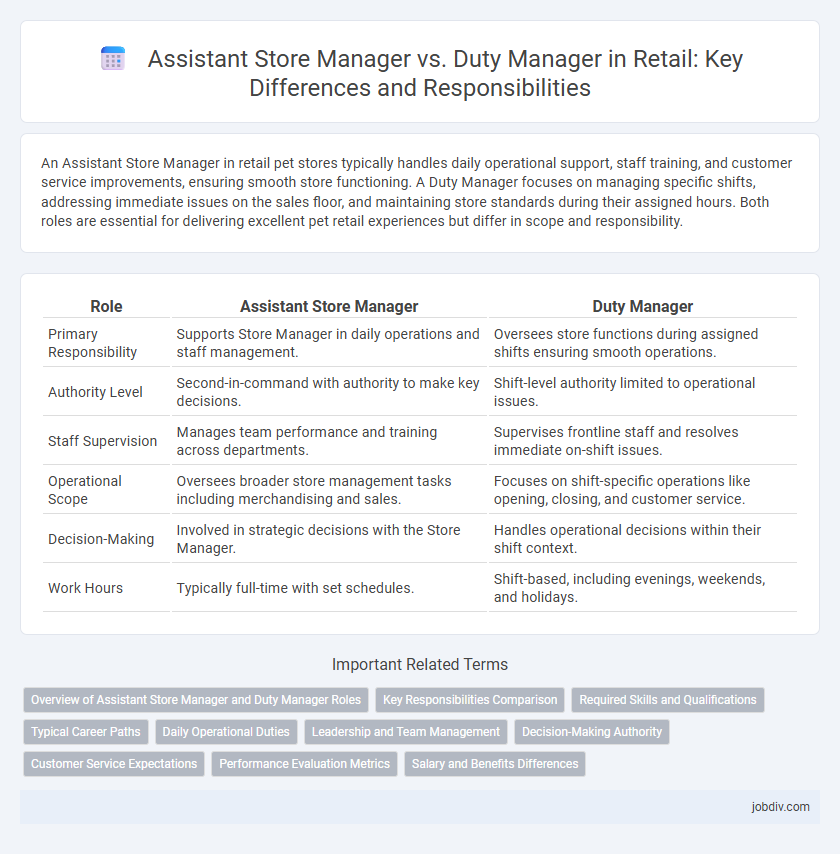An Assistant Store Manager in retail pet stores typically handles daily operational support, staff training, and customer service improvements, ensuring smooth store functioning. A Duty Manager focuses on managing specific shifts, addressing immediate issues on the sales floor, and maintaining store standards during their assigned hours. Both roles are essential for delivering excellent pet retail experiences but differ in scope and responsibility.
Table of Comparison
| Role | Assistant Store Manager | Duty Manager |
|---|---|---|
| Primary Responsibility | Supports Store Manager in daily operations and staff management. | Oversees store functions during assigned shifts ensuring smooth operations. |
| Authority Level | Second-in-command with authority to make key decisions. | Shift-level authority limited to operational issues. |
| Staff Supervision | Manages team performance and training across departments. | Supervises frontline staff and resolves immediate on-shift issues. |
| Operational Scope | Oversees broader store management tasks including merchandising and sales. | Focuses on shift-specific operations like opening, closing, and customer service. |
| Decision-Making | Involved in strategic decisions with the Store Manager. | Handles operational decisions within their shift context. |
| Work Hours | Typically full-time with set schedules. | Shift-based, including evenings, weekends, and holidays. |
Overview of Assistant Store Manager and Duty Manager Roles
The Assistant Store Manager supports the Store Manager in daily operations, staff supervision, and achieving sales targets, ensuring efficient store performance and customer satisfaction. The Duty Manager oversees store activities during specific shifts, handling operational tasks, resolving customer issues, and maintaining safety standards. Both roles demand leadership, strong communication skills, and a focus on delivering a seamless retail experience.
Key Responsibilities Comparison
An Assistant Store Manager primarily focuses on supporting overall store operations, including inventory management, staff supervision, and implementing sales strategies to achieve targets. A Duty Manager handles day-to-day operational issues, ensuring customer satisfaction, managing shift schedules, and addressing immediate staff and store concerns. Both roles require strong leadership skills, but the Assistant Store Manager often engages in broader strategic planning, while the Duty Manager emphasizes operational execution during specific shifts.
Required Skills and Qualifications
Assistant Store Managers require strong leadership skills, proficiency in inventory management, and experience in customer service, often holding a degree in business or retail management. Duty Managers must demonstrate exceptional problem-solving abilities, effective communication skills, and a solid understanding of daily store operations, typically supported by certifications in health and safety or first aid. Both roles demand proficiency in team coordination and conflict resolution to ensure smooth retail operations and customer satisfaction.
Typical Career Paths
Assistant Store Managers usually advance by gaining comprehensive store operations experience, often moving up to Store Manager or Area Manager positions through demonstrated leadership and sales performance. Duty Managers typically focus on shift supervision and operational efficiency, progressing toward roles like Operations Manager or Store Manager by developing strong team management and customer service skills. Both paths emphasize gaining expertise in retail management, but the Assistant Store Manager route leans more toward strategic planning, while the Duty Manager path centers on day-to-day store execution.
Daily Operational Duties
The Assistant Store Manager oversees daily operational duties such as managing staff schedules, ensuring inventory accuracy, and maintaining merchandise presentation standards to optimize store performance. The Duty Manager primarily focuses on front-line problem-solving, customer service issues, and ensuring compliance with health and safety regulations during specific shifts. Both roles collaborate to enhance store efficiency, but the Assistant Store Manager typically engages in broader strategic planning and staff development.
Leadership and Team Management
Assistant Store Managers lead daily operations by directly supervising sales associates, ensuring smooth workflow and maintaining customer service standards. Duty Managers oversee broader shifts and handle immediate operational challenges, balancing staff deployment and conflict resolution to uphold store performance. Both roles require strong leadership skills and team management expertise to motivate employees and drive store success.
Decision-Making Authority
Assistant Store Managers typically have significant decision-making authority over daily store operations, staff scheduling, and customer service issues, directly supporting the Store Manager. Duty Managers often oversee the store in the absence of senior management, making urgent operational decisions and handling immediate problem resolution. Both roles require strong leadership but differ in scope, with Assistant Store Managers focusing on strategic operational execution and Duty Managers emphasizing real-time decision-making during shifts.
Customer Service Expectations
Assistant Store Managers typically lead customer service initiatives, ensuring employees maintain high standards and promptly address customer concerns, driving satisfaction and loyalty. Duty Managers focus on operational oversight during shifts, balancing staff management with resolving immediate customer issues to maintain smooth store functioning. Both roles require strong communication skills and proactive problem-solving to meet and exceed customer service expectations in retail environments.
Performance Evaluation Metrics
Assistant Store Managers are typically evaluated on sales growth, staff turnover rates, and customer satisfaction scores, reflecting their focus on team leadership and operational efficiency. Duty Managers are assessed based on real-time problem resolution, compliance with safety protocols, and shift productivity, emphasizing their role in maintaining smooth daily operations. Both roles require distinct performance metrics that align with their specific responsibilities in retail management.
Salary and Benefits Differences
Assistant Store Managers typically earn a higher salary than Duty Managers due to greater responsibilities in staff supervision and operational decision-making. Benefits for Assistant Store Managers often include performance bonuses, health insurance, and paid time off, while Duty Managers may have more limited access to such perks. Understanding the salary range and benefits packages for these roles helps retail employees make informed career advancement decisions.
Assistant Store Manager vs Duty Manager Infographic

 jobdiv.com
jobdiv.com